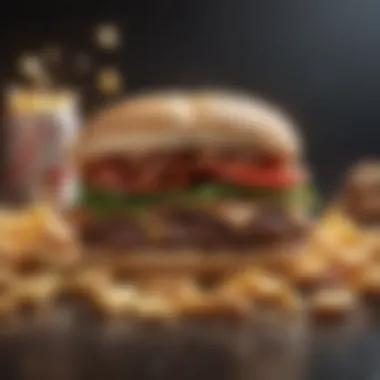Transform Your Weight Loss Journey: Remove These Foods for Success


Fashion Trends
When embarking on a weight loss journey, it's essential to consider the impact of dietary choices on overall health and wellness. The foods we consume play a crucial role in optimizing weight loss efforts. By focusing on eliminating specific foods from our diets, individuals can enhance their chances of reaching their desired health goals. This section will delve into key foods that can hinder weight loss progress, providing actionable advice to guide readers towards a healthier lifestyle.
In the quest for weight loss, certain foods can act as barriers to progress. These foods, often high in saturated fats, sugars, and empty calories, can sabotage even the most diligent weight loss efforts. By identifying and eliminating these culprits from our diets, we can create a more conducive environment for shedding excess weight and improving overall health. From sugary treats to processed snacks, each item we remove brings us one step closer to achieving our weight loss goals.
High-Sugar Foods
One of the primary offenders when it comes to weight loss is high-sugar foods. Items such as candy, soda, and desserts not only provide empty calories but can also spike blood sugar levels, leading to energy crashes and cravings. By cutting out these sources of hidden sugars, individuals can stabilize their energy levels and prevent unnecessary calorie intake, laying a solid foundation for successful weight loss.
Processed Snacks
Processed snacks, often high in unhealthy fats and additives, can derail weight loss progress. Items like chips, cookies, and pre-packaged meals are not only calorie-dense but also lack essential nutrients needed for optimal health. Removing these convenient yet detrimental snacks from our daily intake can pave the way for more nutritious and satisfying food choices, supporting our weight loss efforts in the long run.
Sweetened Beverages
Sweetened beverages, including sugary coffees, energy drinks, and flavored waters, pose a significant obstacle to weight loss. These drinks not only add unnecessary calories to our daily intake but also lack the satiety benefits of whole foods. By swapping out these liquid calorie sources for water, herbal teas, or unsweetened options, individuals can reduce their overall calorie consumption and support their weight loss endeavors.
Introduction
In the realm of weight loss endeavors, making well-informed dietary choices plays a pivotal role in achieving optimal results. The journey towards shedding unwanted pounds often begins with a critical assessment of one's food consumption habits. This introspective dive into the significance of food choices forms the cornerstone of any effective weight loss strategy. By recognizing the impact of specific foods on the body's metabolism and energy balance, individuals can tailor their eating habits for maximum benefit.
Understanding the link between dietary intake and weight management is crucial for anyone embarking on a journey towards a healthier lifestyle. The choices we make regarding the foods we consume can either propel us closer to our desired physique or hinder our progress. Therefore, establishing a solid foundation of knowledge regarding the effects of various food types becomes imperative when striving to eliminate obstacles that impede weight loss progress.
In this article, we delve deep into the subject of identifying and eliminating foods that may sabotage weight loss efforts. By shining a spotlight on these dietary offenders, readers are equipped with the knowledge needed to make informed decisions about their nutrition. Through actionable advice and practical tips, individuals can take charge of their health journey and steer it in the direction of success and sustainable results.
Diving into the nuances of food choices and their impact on weight loss efforts offers a nuanced perspective on the relationship between dietary habits and physical well-being. This section will serve as a comprehensive guide for anyone seeking to navigate the intricate landscape of weight management, providing insights that are not only informative but also empowering. Let's embark on this journey together, unraveling the secrets of effective weight loss through prudent food elimination strategies.
Understanding Weight Loss


In this article, understanding weight loss holds paramount importance. Delving into weight loss requires a profound grasp of the mechanisms that drive this process. By comprehending the biological and physiological aspects of weight management, individuals can make informed decisions that impact their overall health positively. Understanding weight loss enables individuals to create sustainable strategies for shedding excess weight and maintaining a healthy lifestyle. It focuses on deciphering how the body processes food, stores energy, and burns calories, essential for anyone embarking on a weight loss journey.
Caloric Deficit and Food Choices
A pivotal element in weight loss is the concept of caloric deficit. It revolves around consuming fewer calories than the body expends, leading to weight loss over time. By meticulously managing calorie intake and expenditure, individuals can tip the scales towards shedding unwanted pounds. Every food choice matters in the quest for a caloric deficit. Opting for nutrient-dense, low-calorie options is crucial for sustaining a calorie deficit without compromising essential nutrients. Understanding how different food choices affect overall caloric intake is fundamental in achieving weight loss goals.
Role of Macronutrients
Macronutrients play a vital role in supporting weight loss efforts. Proteins, fats, and carbohydrates serve as the building blocks of nutrition and energy. Proteins aid in muscle repair and growth, crucial for boosting metabolism and supporting overall health during weight loss. Fats, when consumed in moderation from healthy sources, provide essential fatty acids vital for bodily functions. Carbohydrates can be strategic in fueling workouts and maintaining energy levels. Balancing macronutrient intake is key to optimizing weight loss outcomes, ensuring a well-rounded approach to nutrition.
The Impact of Certain Foods on Weight Loss
This segment plays a pivotal role in elucidating the profound connection between dietary choices and weight management objectives. Understanding how certain foods impact weight loss is essential for individuals determined to streamline their journey towards health and fitness. By scrutinizing the effects of different food groups on metabolism and energy balance, one can make informed decisions to optimize their nutrition.
Sugar and Refined Carbohydrates
Delving into the realm of sugar and refined carbohydrates unveils a crucial aspect in the quest for weight loss. Consuming high amounts of sugar and refined carbs can lead to rapid spikes in blood sugar levels, promoting fat storage and hindering weight loss efforts. Furthermore, these ingredients often lack essential nutrients, leaving individuals feeling hungry shortly after consumption, which can result in overeating. By cutting down on sugary treats and embracing whole, unprocessed alternatives, individuals can take a significant stride towards achieving their weight loss goals.
Trans Fats and Processed Foods
The deleterious effects of trans fats and processed foods on weight loss cannot be overstated. Trans fats, commonly found in fried and processed products, not only pose health risks but also impede weight loss progress. These fats are notorious for increasing bad cholesterol levels while lowering good cholesterol, thus potentially leading to weight gain and cardiovascular issues. Processed foods, on the other hand, are often laden with refined sugars, unhealthy fats, and excessive sodium, all of which sabotage weight management efforts. By steering clear of trans fats and processed foods, individuals can prioritize nutrient-dense options that fuel their bodies and support weight loss aspirations.
High-Calorie Beverages
Addressing the consumption of high-calorie beverages is a crucial step in refining dietary choices for weight loss success. Popular beverages like sugary sodas, energy drinks, and sweetened coffee concoctions can silently contribute to excessive calorie intake, thwarting weight loss endeavors. Moreover, liquid calories are often less satiating than solid foods, leading individuals to overlook their contribution to overall energy consumption. By opting for water, herbal teas, or unsweetened beverages, individuals can quench their thirst without derailing their weight loss trajectory, making informed choices that align with their health objectives.
Foods to Eliminate for Effective Weight Loss
When embarking on a weight loss journey, the choice of foods plays a significant role in the success of one's efforts. This section focuses on identifying key culprits that hinder progress and must be eliminated from the diet to promote effective weight loss. By understanding the impact of these foods and making informed choices, individuals can optimize their chances of reaching their weight loss goals efficiently.
Added Sugars and Sweetened Beverages


Added sugars, commonly found in sweet treats, soda, and flavored drinks, can sabotage weight loss efforts. These empty calories provide little to no nutritional value while spiking blood sugar levels, leading to energy crashes and increased cravings. By cutting out added sugars and sweetened beverages, individuals can stabilize their blood sugar, reduce overall calorie intake, and pave the way for sustainable weight loss. Opting for water, herbal teas, or unsweetened beverages can help break the cycle of sugar dependency and support long-term health goals.
Processed Snacks and Junk Foods
Processed snacks and junk foods are laden with unhealthy fats, excessive salt, and refined ingredients that impede weight loss progress. These convenient yet detrimental food choices often lack essential nutrients and fiber, leaving individuals feeling unsatisfied and prone to overeating. Eliminating processed snacks and junk foods from the diet can significantly impact weight loss by reducing unnecessary calorie intake, improving nutrient quality, and promoting satiety. Swapping out these options for whole, nutrient-dense snacks like fruits, nuts, or Greek yogurt can enhance overall well-being and support sustainable weight management.
Fried Foods and Trans Fats
Fried foods and items high in trans fats are notorious for their detrimental effects on health and weight. These foods, such as deep-fried snacks, fast food items, and commercially baked goods, are loaded with unhealthy fats that promote inflammation, heart disease, and weight gain. By cutting out fried foods and trans fats from the diet, individuals can reduce their risk of chronic diseases, improve cholesterol levels, and support a healthier body composition. Choosing healthier cooking methods like baking, grilling, or steaming can offer delicious alternatives while promoting better overall health.
White Bread and Pasta
White bread and pasta, refined grains stripped of their nutritional value, can be detrimental to weight loss efforts. These carb-rich foods cause rapid spikes in blood sugar, followed by crashes that leave individuals feeling fatigued and hungry shortly after eating. By eliminating white bread and pasta from the diet and opting for whole grain alternatives like quinoa, brown rice, or whole grain bread, individuals can improve their nutrient intake, stabilize blood sugar levels, and support sustainable weight loss. The fiber content in whole grains promotes satiety and digestive health, contributing to long-term weight management goals.
Sugary Breakfast Cereals
Sugary breakfast cereals are often marketed as quick and convenient options but are laden with added sugars and artificial additives. Starting the day with these sugary cereals can set a negative tone for blood sugar regulation and hunger cues, leading to poor food choices throughout the day. By eliminating sugary breakfast cereals from the morning routine and opting for whole grain cereals, oats, or homemade muesli with fresh fruits, individuals can kickstart their day with a nutritious, filling meal that supports weight loss goals. Choosing nutrient-dense breakfast options can enhance energy levels, promote satiety, and improve overall well-being.
High-Calorie Coffee Drinks
High-calorie coffee drinks, such as sugary lattes, frappuccinos, and flavored beverages, can add unnecessary calories, sugar, and unhealthy fats to one's diet. These indulgent coffee options may provide a temporary energy boost but can lead to weight gain and energy crashes throughout the day. By swapping out high-calorie coffee drinks for black coffee, espresso, or unsweetened tea, individuals can enjoy their favorite beverages without derailing their weight loss progress. Choosing low-calorie or sugar-free alternatives can contribute to overall calorie reduction and support a healthier lifestyle.
: Tips for a Successful Weight Loss Journey
In this segment of the article focusing on eliminating particular foods to support weight loss, we delve into essential strategies for success. To start this transformative journey, understanding the significance of making informed food choices is paramount. By centering one's diet around whole, unprocessed foods, individuals can harness the power of natural nutrients without unwanted additives.
Prioritizing protein-rich options is another pivotal aspect. Proteins are the building blocks for muscle development and essential for a balanced diet. Ensuring an adequate intake of protein can aid in satiety, therefore reducing the inclination to consume excess calories.
Additionally, staying hydrated with water plays a crucial role in weight loss. Water not only helps maintain bodily functions but also promotes a feeling of fullness, potentially curbing unnecessary snacking.


Lastly, adopting mindful eating practices can revolutionize one's relationship with food. By savoring each bite, being present during meals, and recognizing hunger and fullness cues, individuals can develop a healthier approach to eating. Every bite should be a deliberate and conscious choice.
: Focus on Whole, Unprocessed Foods
In the quest for effective weight loss, focusing on whole, unprocessed foods forms the bedrock of a nutritionally sound diet. Whole foods, such as fruits, vegetables, legumes, and whole grains, offer an array of vitamins, minerals, and fiber essential for overall health.
By prioritizing whole foods, individuals sidestep the pitfalls of processed products laden with sugars, unhealthy fats, and empty calories. Opting for foods in their natural state ensures the body receives maximum nutrition, resulting in sustained energy levels and optimal metabolic function.
: Prioritize Protein-Rich Options
Emphasizing protein-rich foods is essential for a successful weight loss journey. Proteins are not only crucial for muscle maintenance and growth but also promote feelings of satiety, reducing the likelihood of overeating.
Incorporating sources of lean protein such as poultry, fish, legumes, and nuts into meals can enhance metabolism and assist in maintaining muscle mass during weight loss. Prioritizing protein-rich options in a balanced diet fosters a sustainable approach to managing caloric intake and supporting overall health.
: Stay Hydrated with Water
Maintaining proper hydration levels through water intake is a fundamental component of any weight loss plan. Water aids in digestion, nutrient absorption, and the elimination of waste products, supporting overall metabolic function.
For those striving to lose weight, hydration is key in promoting satiety and preventing overeating. By consuming an adequate amount of water throughout the day, individuals can control cravings and reduce the likelihood of consuming excess calories.
: Mindful Eating Practices
In the pursuit of effective weight loss, practicing mindful eating is a transformative habit. By slowing down during meals, engaging all the senses, and savoring each bite, individuals can cultivate a deeper appreciation for food.
Mindful eating involves listening to the body's hunger and fullness signals, reducing distractions during meals, and acknowledging emotional triggers that may lead to overeating. By developing a mindful approach to eating, individuals can foster a healthier relationship with food and make informed choices to support their weight loss goals.
Conclusion
In unraveling the tapestry of dietary choices in a weight loss journey, the Conclusion serves as the lighthouse guiding individuals towards a healthier lifestyle. This pivotal section encapsulates the essence of the article, reinforcing the significance of mindful food selection and the elimination of key culprits hindering weight loss efforts. The Conclusion acts as the holistic sum of the discussed foods to eradicate, emphasizing the transformative power of dietary modifications on one's health and well-being.
Delving deep into the nuances of dietary adjustments, the Conclusion consolidates the actionable steps elucidated throughout the article, providing readers with a roadmap to navigating the complex landscape of weight loss. By distilling the key points and benefits of food elimination, this section offers a beacon of clarity amid the multitude of dietary advice pervasive in modern health discourse.
Furthermore, the Conclusion underlines the critical role of sustainable lifestyle changes in achieving lasting weight loss results. It urges individuals to move beyond quick fixes and temporary solutions, embracing a holistic approach centered on nourishing, wholesome foods devoid of detrimental additives.
With a focus on empowerment and education, the Conclusion inspires readers to take charge of their health journey by making informed dietary decisions. It instills a sense of agency in individuals, encouraging them to view food not merely as sustenance but as a potent tool for fostering physical vitality and emotional well-being.
Ultimately, the Conclusion crystallizes the overarching message of the article: by eliminating detrimental foods and embracing a nourishing, balanced diet, individuals can pave the way towards sustainable weight loss and a healthier, more vibrant life.



